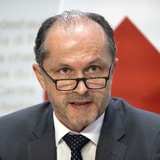Switzerland is not where it should be when it comes to electricity expansion. Last winter clearly showed that. As a result, politicians have decided on measures to promote renewable energies more: the solar express, the wind express and the coat decree. The director of the Federal Office of Energy explains in an interview what needs to happen now.
SRF News: When you took office seven years ago, you wanted Switzerland to be bolder when it came to electricity expansion. Is Switzerland braver today?
Benoît Revaz: We learned from last year. We realized that we had to move forward with domestic renewable production.
We simply have to act now.
The alternative is thermal reserve power plants. This is neither ecologically nor economically desirable. So the political steps were right and important.
But not brave enough yet?
We simply have to act now. Parliament discussed a lot and decided on ambitious goals. Now the projects have to be planned, built and put into operation. At the moment we only have small and medium-sized photovoltaic systems that are booming. That is indeed gratifying. However, there is still a lot to do with other systems such as wind power plants, large solar parks and hydroelectric power plants.
There is a lot of resistance from the population when it comes to major projects. Was this underestimated?
We have always known that when it comes to building or expanding power plants, the difficulty is the approval process, not the technology.
It is now the responsibility of the cantons to draw up plans where the systems can be built.
The “not in my backyard” syndrome exists; people are critical of systems in their neighborhood. That’s why politicians want to shorten the approval process and limit the possibility of complaining.
It would be better to convince the critics not to raise any objections at all. Are you trying this?
It is now the responsibility of the cantons to draw up plans where the systems can be built. People want to know that. A transparent approach and good communication will help reduce the population’s resistance to new installations.
Energy Minister Albert Rösti said in an interview that if resistance persists, a different approach to electricity expansion will be needed in four to five years. Which one does he mean?
In the energy strategy there was always talk of large combined cycle gas power plants as a temporary solution. We will have to analyze that.
What about nuclear power?
The debate about how much we want to rely on nuclear power in the future will probably have to start earlier. But those would be solutions that are very far away.
The interview was conducted by Eliane Leiser.
